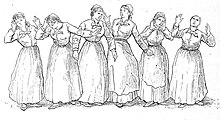
Back هستيريا Arabic هيستيريا ARZ Histeria AST İsteriya xəstəliyi AZ Істэрыя BE Хистерия Bulgarian আবেগোন্মত্ততা Bengali/Bangla Histerija BS Hysterie Czech Hysteri Danish

| Part of a series on |
| Emotions |
|---|
  |
Hysteria is a term used to mean ungovernable emotional excess and can refer to a temporary state of mind or emotion.[1] In the nineteenth century, female hysteria was considered a diagnosable physical illness in women. It is assumed that the basis for diagnosis operated under the belief that women are predisposed to mental and behavioral conditions; an interpretation of sex-related differences in stress responses.[2] In the twentieth century, it shifted to being considered a mental illness.[3] Many influential people such as Sigmund Freud and Jean-Martin Charcot dedicated research to hysteria patients.[4]
Currently, most physicians do not accept hysteria as a medical diagnosis.[5] The blanket diagnosis of hysteria has been fragmented into myriad medical categories such as epilepsy, histrionic personality disorder, conversion disorders, dissociative disorders, or other medical conditions.[5][6] Furthermore, lifestyle choices, such as choosing not to wed, are no longer considered symptoms of psychological disorders such as hysteria.[5]
- ^ Basavarajappa, Chethan; Dahale, Ajit Bhalchandra; Desai, Geetha (2020). "Evolution of bodily distress disorders". Current Opinion in Psychiatry. 33 (5): 447–450. doi:10.1097/YCO.0000000000000630. ISSN 0951-7367. PMID 32701520. S2CID 220731306.
- ^ Chaplin TM, Hong K, Bergquist K, Sinha R (July 2008). "Gender differences in response to emotional stress: an assessment across subjective, behavioral, and physiological domains and relations to alcohol craving". Alcoholism: Clinical and Experimental Research. 32 (7): 1242–1250. doi:10.1111/j.1530-0277.2008.00679.x. PMC 2575018. PMID 18482163.
- ^ Beattie M, Lenihan P (2018). Counselling Skills for Working with Gender Diversity and Identity. London: Jessica Kingsley Publishers. p. 83. ISBN 9781785927416.
- ^ North CS (November 2015). "The Classification of Hysteria and Related Disorders: Historical and Phenomenological Considerations". Behavioral Sciences. 5 (4): 496–517. doi:10.3390/bs5040496. PMC 4695775. PMID 26561836.
- ^ a b c Micale MS (2019). Approaching Hysteria: Disease and Its Interpretations. Princeton University Press. ISBN 978-0-691-60561-6.
- ^ Slater E (May 1965). "Diagnosis of "Hysteria"". British Medical Journal. 1 (5447): 1395–1399. doi:10.1136/bmj.1.5447.1395. PMC 2166300. PMID 14286998.